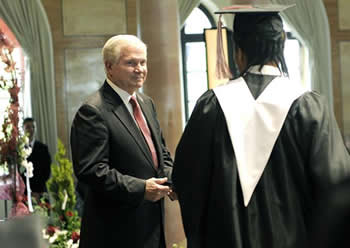America’s veterans and active duty military personnel are not only integral to our safety and prosperity as a nation; they are also the true embodiment of honor and national pride. The men and women who have so admirably served our country deserve enhanced access to education opportunities as well as post-service jobs and public services. The question is: are our veterans and current servicemen and women receiving the benefits they need and deserve? Let’s take some time to look at the educational benefits available to veterans and the men and women who currently serve our great nation.
Veterans returning from military service are enrolling in college programs in record numbers. What are the current educational benefits available to our military and how are colleges across the nation working to further improve the services they offer?
Primarily, the implementation of the new GI Bill, renamed the Post-9/11 GI Bill, helps to connect American’s veterans and current servicemen and women to higher education by significantly expanding the education benefits available to them. The new GI Bill helps veterans to earn their degree by paying the full tuition and fees at over 4,000 colleges while also providing a monthly living and book and supply stipend.
However, some are still finding government education initiatives, like the new GI Bill, to be inadequate and college programs lacking in terms of support services and outreach programs. The “culture shock” of readjustment to the civilian world of college campuses is often difficult for veterans, a recent study from the National Survey of Student Engagement found.
The transition from military to civilian life is unquestionably hard, and the reported lack of support on college campuses can only make the transition more difficult. Of the 11,000 veterans surveyed, many reported feeling “disconnected” from the school they attend. The report suggests that college campuses and administration should seek out ways to more effectively engage veterans and provide them with enhanced outreach programs and “supportive environments that promote success.” Brian Hawthorne, a student veteran who served two tours of duty in Iraq with the Army and is now a graduate student at George Washington University, urges educators to fully understand and adequately address the differences between veterans and traditional college students, and to provide student veterans with the network of support systems they need.
Department store super-power Wal-Mart has also contributed, giving $10 million over a five year period to non-profit organizations that offer veterans job training and higher education or continuing education opportunities. J.C. Penny, another prominent department store, recently gave $1 million for 5,000 veterans to purchase business clothes for their new civilian workplaces. Robert Kotick, CEO of Activision Blizzard, the gaming company which produces popular video games like the Call of Duty series, was persuaded by the sheer number of unemployed veterans to establish a $1 million foundation to support them. The company recently announced an additional $1 million gift.
Student Veterans of America, a student run organization which helps student veterans transition into college and earn their degree, is one of the countless student-run organizations that many colleges offer to their veterans. There are currently 300 college chapters and Michael Dakduk, the deputy executive director of the organization, hopes that the number of chapters nationwide will continue to expand. Through his work, Dakduk says what amazes him the most is the number of veterans “succeeding, despite the obstacles.”
Online and ground school education opportunities for veterans and current military servicemen and women have come a long way, but not far enough. By continuing to improve veteran’s educational benefits and increasing these benefits as early and often as possible, our government, our nation and our higher education system can work to honorably serve those who have so honorably served us.
Many colleges are trying to combat the issues veterans face and make the higher education process and experience easier. Colleges have traditionally given honor students and athletes first dibs on classes or “priority registration.” Now, across the nation, student veterans are being given the same opportunity. Prominent ground colleges, like the University of Arizona, are giving veterans the opportunity to register for classes early, ensuring that the classes they want and need to take are available. In 2009, the state of California mandated that all state schools give veterans and current service members priority registration. Additionally, online colleges and universities offer veterans a multitude of education opportunities with flexible class scheduling and extensive student services.
A number of corporations are also trying to increase the availability of education benefits for veterans by donating millions of dollars to veteran education programs. Microsoft has given $2 million in cash and $6 million in cutting-edge software to organizations that provide veteran education, skill training and job placement. The money will also be used for services such as career counseling and childcare. An officer in the Navy for nine years, Ross Janson is one veteran who has taken advantage of the Microsoft funding. Janson is taking computer and technology courses at Veterans Incorporated, one veteran’s education organization that received Microsoft funding, to prepare for a civilian job in an increasingly tech-driven economy.










